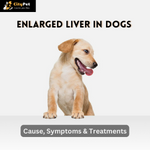Enlarged Liver In Dogs- Symptoms, Cause, & Treatments
This article discusses the symptoms, causes, and treatments for enlarged livers in dogs.
Enlarged liver, also known as hepatomegaly, is a common condition in dogs. It is a result of the liver growing in size beyond its normal limits. This condition is often caused by the progression of infectious canine hepatitis or the development of chronic hepatitis. If the liver tissue is benign, there are a few potential causes of enlarged livers in dogs.
If you’re concerned that your pet may have an enlarged liver, check with your veterinarian immediately. The most common causes, symptoms, and treatments are as follows:

Causes:
There are various causes of an enlarged liver in dogs, including:
- Hepatitis: Inflammation of the liver can cause it to enlarge.
- Infectious diseases: Bacterial, fungal, or viral infections such as leptospirosis, Lyme disease, and canine distemper can cause an enlarged liver.
- Toxicity: Ingestion of toxic substances such as pesticides, drugs, and heavy metals can damage the liver and cause it to enlarge.
- Cancer: Tumors in the liver can cause it to enlarge.
- Congenital abnormalities: Some dogs may be born with liver abnormalities that can cause them to enlarge.
- Canine adenovirus: It is another potential cause for enlarged livers in dogs; however, this is usually paired with clinical signs such as fever, anorexia, lethargy, and a high white cell count on blood work.
- Hepatitis portosystemic shunts: In some cases, dogs may have a form of liver disease known as hepatitis portosystemic shunts or shunts liver disease.
- Canine herpesvirus: It can also be a factor in this condition.
- Other causes: viral diseases and liver dysfunction and severe reduction in the use of the liver due to diseases like cirrhosis or inflammation and scarring.

Symptoms:
This is a genetic condition and can cause more severe symptoms than other forms of liver disease in dogs. Common signs of this condition are:
- Abdominal distension
- Loss of appetite
- Vomiting
- Diarrhea
- Weight loss
- Seizures
- Lethargy and weakness
- Jaundice (yellowing of the skin and eyes)
- Increased thirst and urination
- Abdominal pain
- Vision problems
In more severe cases, dogs may experience
- Hepatic encephalopathy (a severe brain condition),
- Including coma and
- Eventual blindness.
Unfortunately, this disease progresses quickly if not caught early in your dog’s life.
Dogs born small or with a liver shunt can set off more severe symptoms such as ascites buildup, which is the accumulation of fluid in the belly that causes abdominal swelling.

Diagnosis
The veterinarian may perform diagnostic tests to identify the cause and severity of the condition.
- A recommended liver biopsy is the only way to accurately diagnose.
- The vet will want to look at the entire liver region and may order x-rays or radiographs to see if any tumors are present.
- If a tumor is present, further imaging such as an ultrasound or CT scan may be needed to reveal scar tissue or other types of tumors.
- Your vet may also take a tissue sample from the liver to determine if any cancer cells, bacteria, or other foreign bodies are present.
- This will help them distinguish between the benign and malignant nature of the tumor.
- Once the cause for the enlarged liver has been determined, your veterinarian can begin devising a treatment plan depending on the severity stage and cause the severity of symptoms.
- To prevent future issues related to an enlarged liver in dogs it’s important to schedule regular exams with your veterinarian so they can monitor any changes that occur over time.

Treatments:
During exams, your vet will detect if your dog’s liver is enlarged and can recommend treatment plans. The prognosis of your dog’s condition depends on the underlying cause of the enlargement.
Treatment may include reducing liver inflammation, diet supplements, additional vitamins and minerals, steroids, antibiotics, and antioxidants. Depending on the stage of cirrhosis or hepatitis present in your dog’s abdominal area, symptoms will vary and so will their prognosis.
Treatment may include:
- Medications: Depending on the cause of the enlarged liver, medications such as antibiotics, anti-inflammatory drugs, and corticosteroids may be prescribed.
- Diet: Dogs with an enlarged liver may require a special diet to reduce stress on the liver. This may include a protein increase, reducing salt intake, and avoiding processed foods.
- Surgery: In some cases, surgery may be required to remove a tumor or correct a congenital abnormality.
- Supportive care: Dogs with an enlarged liver may require supportive care such as IV fluids, anti-nausea medications, pain relief, subcutaneous (SQ) fluids, and antibiotics to reduce inflammation as well as scarring in the liver.
Summary
In summary, an enlarged liver in dogs can have various causes and symptoms. Diagnosis for enlarged livers can be done through palpation (feeling for abnormalities) as well as through blood work to reveal any underlying problems or cancers. Early diagnosis and appropriate treatment are essential to ensure the best outcome for the affected dog. If you suspect that your dog has an enlarged liver, consult with your veterinarian as soon as possible

